
Food wastage © Kirsi Silvennoinen, Luke
According to estimates by the Natural Resources Institute Finland (Luke), up to 500 million kilos of food is wasted every year in Finland. Financially, this corresponds to approximately one billion euros. The objective of the UN and the European Commission is to reduce consumer level and in-store food wastage by half by 2030, and to reduce wastage in all parts of the food supply chain. The share of nutrition and the food supply chain of the environmental effects of all our consumption is 40%, which is more than the effects of either traffic or housing.
In Southwest Finland, the problem is being tackled by creating a roadmap for reducing food wastage throughout the food supply chain from food production to the plate of the consumer. In cooperation with various food supply chain operators, Luke has created the roadmap as part of the circular economy road map for the entire Southwest Finland. The funding comes from the EU-funded Circwaste project. The roadmap plan was created using a workshop concept developed for the purpose, based on three separate workshops.
Useful workshop concept for decreasing food wastage
One of the essential assignments of Luke in the Circwaste project has been to create a workshop concept for recognising the reasons for food wastage, finding means of reducing food wastage, and creating tangible actions for reducing food wastage.
The concept consists of three workshops. The first examines the reasons for food wastage in the various phases of the chain, the second seeks means of reducing food wastage, and the third creates tangible actions for carrying out the selected means and creates a roadmap for reducing food wastage on a selected area.
‘Each workshop has required careful planning and plenty of work by the research team, in order to motivate the workshop participants, make the contents of the workshops inspiring, and reach the defined goals’, says researcher Inkeri Riipi from Luke.
For the first workshop, the research team charted the types, amounts, and reasons of wastage in the various phases of the food supply chains extensively. The environmental effects for various product groups were also examined. These materials were used by the participants to discuss the types, amounts, and reasons for wastage in the various phases of the chain. There were many thoughts for each phase of the chain, and they were combined into larger entities for the second workshop.
The second workshop approached the means of reducing food wastage by telling the participants why reducing food wastage is important, what kinds of research has been carried out on the topic, and what kinds of results the first workshop yielded. The researchers gave real-life examples from Finland and abroad. The workshop also introduced a Finnish actor explaining the actions of their organisation in reducing wastage. The workshop produced a total of 21 ideas for reducing food wastage.
The third workshop focused on making the ideas tangible. The research team had discussed the ideas further and combined some quite similar ones. They were used to create six groups around different themes. The teams also featured experts in the field in question talking about matters related to the theme. The participants needed to define a joint objective for the group to reach the targets. They also needed to record any necessary intermediate phases.
According to the researcher, the workshop concept can be copied elsewhere. ‘The workshop concept is currently being developed further, and it can be applied anywhere in Finland. We are acquiring experience from the application of the project in other places and other European countries through one Finnish and one EU project, both of which are ongoing’, Riipi summarises.
The roadmap work will continue to the implementation phase of the plans acquired in the workshops.
You can follow the progress of the work at https://kiertotaloudenvarsinaissuomi.fi/in-english/
Read more
More information
Inkeri Riipi, Researcher, Natural Resource Institute Finland, firstname.lastname@luke.fi
Pilvi Kara, Project Specialist, Regional Counsil of Southwest Finland, firstname.lastname@varsinais-suomi.fi